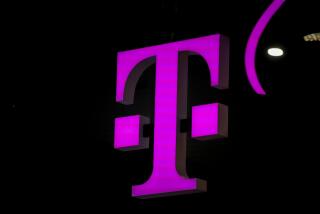Justice Dept. OKs Sprint’s 20% Sale to French, German Phone Firms : Telecom: But the $4.2-billion deal has strings attached relating to opening of European markets.
- Share via
WASHINGTON — The U.S. Justice Department on Thursday gave Sprint Corp. the go-ahead to sell a 20% stake to France Telecom and Deutsche Telekom for about $4.2 billion, but restricted plans by the firms to freely compete for business until France and Germany open their telephone markets.
The Westwood, Kan.-based long-distance carrier, which announced the alliance last year, hopes the deal will enable it to achieve a global reach rivaling that of AT&T; Corp. and MCI Communications Corp. The infusion of capital will also help bolster Sprint at a time when it is preparing to modernize its local phone network and spend billions of dollars to build a new wireless network in the United States for a new generation of mobile communications services.
“This investment will have a huge impact on consumers” by allowing “us to become an even more formidable competitor in the U.S. in local, long-distance and wireless communications and give us the ability to offer new and advanced services at better prices,” said J. Richard Devlin, executive vice president of law and external affairs for Sprint.
The investment by France Telecom and Deutsche Telekom still must be approved by the Federal Communications Commission, which is expected, and by the European Union antitrust authorities. In addition, the settlement agreement negotiated between the Justice Department and Sprint must be reviewed by a federal judge.
Normally, such judicial review is routine. But earlier this year Federal Judge Stanley Sporkin surprised the Justice Department by blocking a consent decree with Microsoft Corp. He was later overturned.
Under the agreement, which will apply until the European partners’ home markets are open to competition, Sprint can’t receive more favorable regulatory or price treatment in France and Germany than any other competitors, and it can’t provide any new service that French and German regulators don’t allow rivals to provide, said Steven C. Sunshine, deputy assistant attorney general for mergers at the Justice Department.
“Sprint’s prices can’t be lower than other competitors,” Sunshine said.
The companies must also disclose some normally confidential information about rates and other service terms so that U.S. regulators can determine if they are running afoul of provisions in the agreement that bar financial cross subsidization of telecommunications services. The department said it imposed the restrictions to ensure that other U.S. telecommunications firms aren’t put at a competitive disadvantage.
American and foreign telecommunications analysts on Monday praised the agreement.
“In the international arena, profit margins are very high so anything that promotes increased competition is very useful,” said Leonard Waverman, director of the center for International Studies at the University of Toronto, who has been following the development of the deal from Paris. “This will definitely make Sprint a more significant competitor internationally,” he added.
“I think putting some pressure on Europe is a move that makes sense if we want some reciprocal action from our trade partners,” said Dan Elron, a specialist in telecommunications at Coopers & Lybrand. “The French had been inclined to slow down the opening of their markets” even though the European Commission has deemed that European telephone markets be deregulated by Jan. 1, 1998.
Sprint officials say they have not yet settled on a name for the company that will direct their alliance, but said the venture would be directed by a Global Partnership Board on which the three companies will have equal votes. The new company will start operations with more than 2,100 employees and have estimated first year revenue of $450 million.
More to Read
Inside the business of entertainment
The Wide Shot brings you news, analysis and insights on everything from streaming wars to production — and what it all means for the future.
You may occasionally receive promotional content from the Los Angeles Times.










